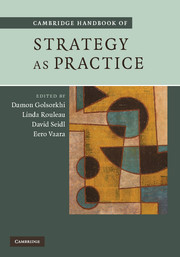Book contents
- Frontmatter
- Contents
- List of figures
- List of tables
- List of contributors
- Introduction: What is Strategy as Practice?
- PART I ONTOLOGICAL AND EPISTEMOLOGICAL QUESTIONS
- 1 Practice in research: phenomenon, perspective and philosophy
- 2 Epistemological alternatives for researching Strategy as Practice: building and dwelling worldviews
- 3 Practice, strategy making and intentionality: a Heideggerian onto-epistemology for Strategy as Practice
- 4 Constructivist epistemologies in Strategy as Practice research
- 5 Constructing contribution in ‘Strategy as Practice’ research
- 6 The challenge of developing cumulative knowledge about Strategy as Practice
- PART II THEORETICAL DIRECTIONS
- PART III METHODOLOGICAL TRACKS
- PART IV APPLICATION VARIATIONS
- Author Index
- Index
- References
6 - The challenge of developing cumulative knowledge about Strategy as Practice
Published online by Cambridge University Press: 05 October 2012
- Frontmatter
- Contents
- List of figures
- List of tables
- List of contributors
- Introduction: What is Strategy as Practice?
- PART I ONTOLOGICAL AND EPISTEMOLOGICAL QUESTIONS
- 1 Practice in research: phenomenon, perspective and philosophy
- 2 Epistemological alternatives for researching Strategy as Practice: building and dwelling worldviews
- 3 Practice, strategy making and intentionality: a Heideggerian onto-epistemology for Strategy as Practice
- 4 Constructivist epistemologies in Strategy as Practice research
- 5 Constructing contribution in ‘Strategy as Practice’ research
- 6 The challenge of developing cumulative knowledge about Strategy as Practice
- PART II THEORETICAL DIRECTIONS
- PART III METHODOLOGICAL TRACKS
- PART IV APPLICATION VARIATIONS
- Author Index
- Index
- References
Summary
The ‘Strategy as Practice’ perspective has recently attracted a substantial following of scholars interested in developing a better understanding of strategy as ‘something people do’ rather than something that ‘organizations have’ (Johnson et al. 2003; Jarzabkowski et al. 2007; Johnson et al. 2007; Whittington 2006). Under this banner, researchers have begun to examine issues like what happens in strategy meetings (Schwartz and Balogun 2007; Jarzabkowski and Seidl 2008; Hodgkinson et al. 2006), how various strategic management tools are used (Kaplan and Jarzabkowski 2006; Stenfors et al. 2007) and how middle managers can and do contribute to strategy making (Balogun and Johnson 2004; Rouleau 2005). There is also a more critical stream in Strategy as Practice writing that has focused on the discursive practices of strategists (Laine and Vaara et al. 2007; Ezzamel and Wilmott, 2008) or on the roles of the wider strategy community including academics in the legitimation of potentially doubtful strategy practices (Whittington et al. 2003). Finally, there have been several attempts to position the Strategy as Practice perspective with respect to broader currents in theories of practice (Hendry and Seidl 2003; Chia and MacKay 2007; Johnson et al. 2007; Seidl 2007; Whittington 2006; Jarzabkowski 2004).
This chapter begins to address a set of key but deceptively simple questions about this emerging body of work. Where is it heading?
- Type
- Chapter
- Information
- Cambridge Handbook of Strategy as Practice , pp. 91 - 106Publisher: Cambridge University PressPrint publication year: 2010
References
- 9
- Cited by



